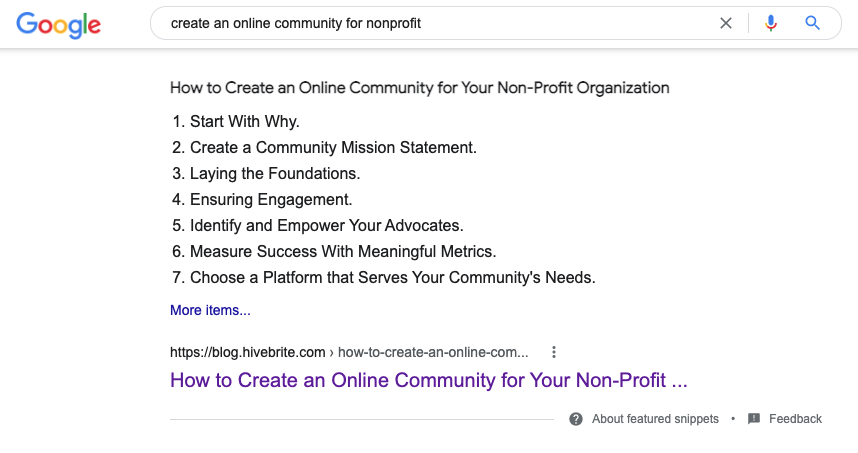Organic search drives over half of all web traffic, making it one of the most valuable channels for an organization!
|
Quick definition: Organic search results are the unpaid results that appear on a search engine results page after a query. |
When you think about it, this isn't so surprising—after all, who has not said, "Google it!”!"
Search Engine Optimization (SEO) is the process of optimizing your content to make it more visible in search engine results.
The higher your content is ranked on search engine result pages, the more likely it is to be clicked.
Why Is SEO Important for an Online Community?
Optimizing your community for search engines can drive traffic, increase your brand's visibility, and encourage new members to join!
According to Google's Economic Impact Report, organic search is five times more valuable than Google Ads.
Let's imagine you're running a community that brings together climate activists and gardeners. If someone is searching for "how to compost", "how to start a garden", or "community for gardeners", you want your community to appear near the top of the results.
This is where SEO comes into play.
While Google cannot crawl private pages, you can apply SEO best practices to your public pages to help them climb the search rankings.
This article will cover some basic techniques to help you build the foundation of your SEO strategy.
Pick the Right Keywords
Keywords are the words and phrases people enter into search engines when looking for information.
You want the keywords on your pages to be similar to those your audience is searching for. Doing this means you have a better chance of appearing at the top of the search results (and driving people to your community).
For example, if you Google "create an online community for nonprofit", Hivebrite appears at the top:

Non-profit organizations can benefit from Hivebrite's community engagement platforms. So we want our website to rank high for the keywords "create an online community for nonprofit".
Tips for finding the right keywords:
Think like your ideal member. Ask yourself, if I wanted to find my community, what would I type into Google?
We also recommend asking your existing members how they found your community. Understanding the journey your members took to join your community is often overlooked by community managers.
Here’s a template to get you started:
Hi, [Community Member Name]!
My name is [Your Name] and I’m [Your Title] at [Organization Name].
I wanted to drop you a quick note to thank you for your participation in our community so far. I enjoyed [reading your latest blog post] [seeing you uplift other members] [another example of their positive community behaviour].
I would love to understand more about the journey you took to joining [Community Name] to help me grow the community.
Please could you tell me a bit more about how you found our community and your experience so far?
Thanks,
[Your Name]
Leverage long tail keywords
A long tail keyword is a phrase that is generally made from three to five words.
“Events for women working in 3D printing” is an example of a long tail keyword and “3D printing events” is an example of a short keyword.
Since long tail keywords are more specific than generic terms they tend to boast lower search volumes but they attract more relevant traffic, are less competitive, and are easier to rank well on.
Use keyword research tools
You also need to consider your keywords' search volume and the competition.
Check out the following tools to get data on keyword volume and trends, keyword competition, similar keywords, and more.
Site Audit is also a handy tool to audit your website pages and help you understand areas in which you can improve for better optimization.
Analyze your existing content for keywords
Look at your existing content for keyword inspiration. Your pages and posts probably already have keywords that you can choose to emphasize more strongly.
How to Use Your Keywords Effectively
Once you've decided on your keywords, you need to add them to your relevant pages.
However, you can't just chuck your keywords on a page and hope for the best.
You need to create compelling content around your keywords that adds value to your visitors.
Keywords should sound natural when woven into your content. If you find it tricky to use a keyword without your content sounding awkward, you may need to rethink your choice!
You can add your keywords in the following places:
Title Tag: A page's title tag is displayed as part of the search snippet in a search engine results page. They are vital to helping Google understand what your page is about and so an ideal place to add keywords.
Meta descriptions: These are the snippets people see when your link appears on a search engine.
Meta descriptions don't necessarily impact your Google ranking, but they provide a better experience for your readers.
Ensure these descriptions are concise and contain the relevant keywords related to your content and the search query.
Headers and Subheaders: Adding keywords to your pages' headers and subheaders is good for SEO and readability.
Alt-Text: Alt text's primary purpose is to describe images to people who cannot see them. It is also crucial for SEO, enabling search engines to index an image correctly.
URL Slugs: A URL slug is the part of the URL after the last backslash. For example, the article you're reading now has a URL that looks like this:

Google uses the URL as a factor in ranking your page, so if the URL slug includes your keywords, then Google will be more likely to rank it.
Optimize Page Loading Speed
Maintaining a quick-loading website is an increasingly crucial factor for user experience and SEO.
Large media files, bulky site code, and plugins can all make your pages take longer to load.
Use Google's Page Speed Insight tool to calculate the performance of your pages on mobile and desktop. It allows you to run a complete page diagnosis and detect improvement opportunities.
Build Internal Links
Building links is another tactic to improve your SEO.
An internal link is any link from one page on your website to another page on your website.
By adding links to follow along with descriptive anchor text, you can indicate to Google which pages of your site are essential and what they are about.
-png.png?width=692&name=image_descriptive%20anchor%20text%20(1)-png.png)
|
Quick definition: Anchor text is the clickable text visitors see in a hyperlink; text that's usually uniquely coloured, underlined, or both. |
Internal links also make your pages easier to navigate for your visitors.
Optimize For Humans First
Google's algorithms take into account a LOT of factors. And these factors are constantly evolving to keep up with changes in user behavior and advances in machine learning.
The best practices mentioned in this article cover some of the basics and are certainly not exhaustive.
|
Top tip: Set up Google Search Console to track your SEO progress. Its dashboards give you data on your page performances in search engine results! |
Fresh, relevant, compelling content that adds value to your readers will always remain a critical component of an SEO strategy.
Sure, you need to optimize your pages so that Google can find them. However, you should always have your members and their user experience top of mind when making any optimizations. Remember that your community is for humans (not Google's bots).
Hivebrite is an all-in-one community management platform. We empower organizations of all sizes and sectors to launch, manage and grow fully branded private communities. Schedule a demo today!



%20(1).png?width=1650&name=hivebrite-logo%20(2)%20(1).png)